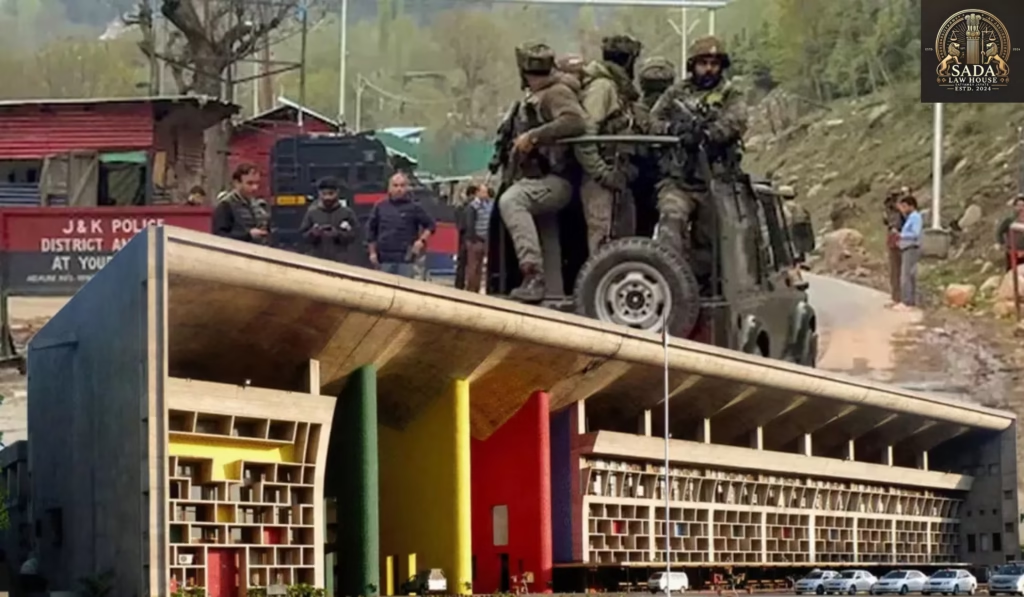Punjab–Haryana High Court Rejects PIL Against Online Betting Ads, Citing Statutory Remedies Under Gambling Law
Trending Today Punjab–Haryana High Court Rejects PIL Against Online Betting Ads, Citing Statutory Remedies Under Gambling Law Supreme Court Reserves Interim Order on Waqf (Amendment) Act, 2025: Key Legal and Constitutional Highlights HDFC Bank CEO Sashidhar Jagdishan Moves Bombay HC to Quash FIR in ₹2 Crore Bribery Case Filed by Lilavati Trust IPS Officer’s Husband Arrested in ₹7.2 Crore BMC Redevelopment Scam: Mumbai EOW Crackdown Sparks Integrity Debate Bombay High Court Orders Strict Action Against Illegal Occupants in MHADA Transit Homes Ex-Lilavati Hospital Trustee Chetan Mehta Seeks Bombay High Court Relief in ₹1,243 Crore Fraud Case INTERNSHIP OPPORTUNITY AT CODITAS, PUNE LEGAL JOB OPPORTUNITY AT SARVAANK ASSOCIATES, BENGALURU LEGAL JOB OPPORTUNITY AT SULLAR LAW CHAMBERS, CHANDIGARH LEGAL JOB OPPORTUNITY AT PEOPLE PRIORITY HR PARTNERS, DELHI Punjab–Haryana High Court Rejects PIL Against Online Betting Ads, Citing Statutory Remedies Under Gambling Law KASHISH JAHAN 25 June 2025 The Punjab and Haryana High Court dismissed a PIL against online betting ads, emphasizing the need to follow statutory remedies like the Haryana Prevention of Public Gambling Act, 2025, and avoiding judicial overreach through misuse of PILs. High Court Upholds Statutory Path Over PIL in Gambling Ad Case A division bench of the Punjab & Haryana High Court, led by Chief Justice Sheel Nagu and Justice Sumeet Goel, has dismissed a Public Interest Litigation (PIL) that aimed to ban online betting and opinion-trading advertisements under Indian gambling laws. The court emphasized that the recently enacted Haryana Prevention of Public Gambling Act, 2025 and other statutory remedies provide adequate legal avenues—making a PIL unnecessary and improper in this context. Statutory Remedy vs Extraordinary Jurisdiction The court reinforced a crucial constitutional principle: when effective statutory remedies exist, constitutional courts should not entertain PILs. Bypassing these legal mechanisms through PIL leads to judicial overreach and adds unnecessary burden to the court system. This decision promotes the importance of legislative procedures in addressing legal grievances. Misleading Online Betting Ads Under Scrutiny The PIL alleged that platforms such as YouTube, X (formerly Twitter), and other social media networks were running deceptive advertisements for online betting and opinion-trading platforms. The petitioners argued these ads violated gambling regulations by making false promises and operating without proper regulation. Key Parties and Stakeholders in the Case – Anuj Malik and others served as petitioners, raising concerns about misleading betting advertisements. – The bench included Chief Justice Sheel Nagu and Justice Sumeet Goel, presiding over the matter. – The State Government of Haryana underscored the relevance of the newly introduced Haryana Prevention of Public Gambling Act, 2025 as an effective statutory remedy. Court Decision and Legal Direction The court dismissed the PIL and advised the petitioners to file their grievances through proper statutory channels under the existing Act. The judgment highlighted the need for judicial restraint and reinforced that PILs should be reserved for scenarios lacking adequate legislative solutions. Broader Legal Impact and Public Importance This decision reiterates that PILs should not substitute structured legislative frameworks, especially when laws like the Haryana Prevention of Public Gambling Act exist to regulate the issue. The ruling protects the principle of separation of powers and discourages misuse of PILs that could divert valuable judicial resources. Constitutional Significance and Article 14 The High Court’s judgment supports Article 14 of the Indian Constitution, which ensures equality before the law. It underscores that all litigants must follow the same statutory processes and that constitutional jurisdiction should be reserved for matters of true constitutional importance—not routine legal complaints. Leave a Reply Cancel Reply Logged in as Sada Law. Edit your profile. Log out? Required fields are marked * Message* Live Cases Punjab–Haryana High Court Rejects PIL Against Online Betting Ads, Citing Statutory Remedies Under Gambling Law Sada Law • June 25, 2025 • Live cases • No Comments Supreme Court Reserves Interim Order on Waqf (Amendment) Act, 2025: Key Legal and Constitutional Highlights Sada Law • June 25, 2025 • Live cases • No Comments HDFC Bank CEO Sashidhar Jagdishan Moves Bombay HC to Quash FIR in ₹2 Crore Bribery Case Filed by Lilavati Trust Sada Law • June 25, 2025 • Live cases • No Comments 1 2 3 … 5 Next »


